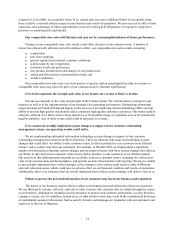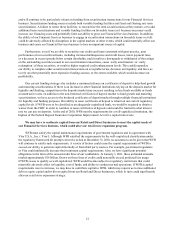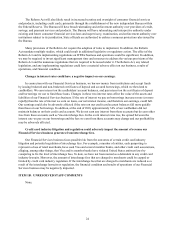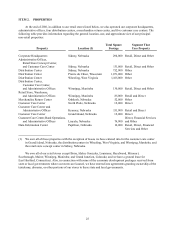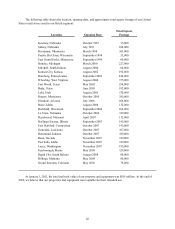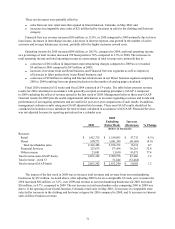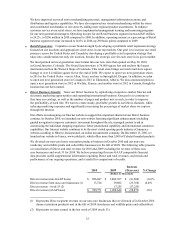Cabela's 2010 Annual Report Download - page 33
Download and view the complete annual report
Please find page 33 of the 2010 Cabela's annual report below. You can navigate through the pages in the report by either clicking on the pages listed below, or by using the keyword search tool below to find specific information within the annual report.23
Our Financial Services business faces the risk of a complex and changing regulatory and legal
environment.
Our Financial Services business operates in a heavily regulated industry and is therefore subject to a wide
array of banking and consumer lending laws and regulations. Failure to comply with banking and consumer
lending laws and regulations could result in financial, structural, and operational penalties being imposed. For
example, on March 5, 2010, WFB received a preliminary report related to a compliance examination conducted in
the second quarter of 2009 from the FDIC. WFB received the final version of this report from the FDIC on May 19,
2010. The FDIC’s findings were that certain practices by WFB regarding the assessment of overlimit fees, late fees,
and penalty interest charges and contacting delinquent cardholders at their place of employment were improper
because such practices were unfair and/or deceptive under applicable law. The FDIC has indicated that it intends to
require WFB to reimburse cardholders who paid improper fees and/or interest charges and has also indicated that
it will seek to impose on WFB a monetary penalty as a result of the improper practices. Subsequent to January 1,
2011, WFB and the FDIC agreed in principle to settle all matters related to the 2009 compliance examination. As
of January 1, 2011, we had accrued a liability of $8 million in our consolidated financial statements for the matters
cited by the FDIC in its examination report.
The CARD Act and related regulations restrict our ability to increase interest rates on existing credit card
balances, charge over-limit fees, and charge fees for making a payment. The CARD Act provisions also further
define acceptable due dates, payment allocations, disclosure requirements, and “reasonable” fees and prohibit
increasing the interest rates on variable-rate credit card accounts that are subject to a fixed-rate floor. As a result
of the CARD Act, our Financial Services Revenue was negatively impacted. Beginning in February 2011, the third
phase of the CARD Act requires creditors that increased annual percentage rates due to credit criteria, market
conditions, or other factors on or after January 1, 2009, to review accounts at least every six months to determine
whether the annual percentage rate should be reduced, which could result in reduced interest income. The CARD
Act also requires the Federal Reserve to conduct various studies regarding interchange fees, credit limit reductions,
financial literacy, marketing, and credit card terms and conditions. Future legislation or regulations may be issued
as a result of these studies. Future changes as a result of these studies may result in future negative impacts to the
revenue from our Financial Services business.
In addition, as a Visa member bank, WFB must comply with rules and regulations imposed by Visa. For
example, WFB and Cabela’s could be fined by Visa for failing to comply with Visa’s data security standards.
The Dodd-Frank Wall Street Reform and Consumer Protection Act may impact the practices of our
Financial Services business and could have a material adverse effect on our results of operations.
On July 21, 2010, the Reform Act was signed into law. The Reform Act, as well as other legislative and
regulatory changes, could have a significant impact on us by, for example, requiring WFB to change its business
practices, imposing additional costs on WFB, limiting fees WFB can charge for services, impacting the value of
WFB and its assets, or otherwise adversely affecting WFB’s business. A description of the Reform Act and other
legislative and regulatory developments is contained in “Management’s Discussion and Analysis of Financial
Condition and Results of Operations - Developments in Legislation and Regulation.”
In addition, the Reform Act directs the Comptroller General of the United States to complete a study within
18 months of the Reform Act’s enactment to determine whether it is necessary, in order to strengthen the safety and
soundness of institutions or the stability of the financial system, to eliminate certain exceptions under the BHCA,
including the exception for credit card banks. If the credit card bank exception were eliminated or modified, we may
be required to divest our ownership of WFB unless we were willing and able to become a bank holding company
under the BHCA. Any such forced divestiture would materially adversely affect our business and results of operations.
The Reform Act will also effect a number of significant changes relating to asset-backed securities, including
additional oversight and regulation of credit rating agencies and additional reporting and disclosure requirements. In
addition, the Reform Act will prohibit issuers and payment card networks from placing restrictions on vendors relating to
credit card transactions, which could affect consumer behavior and the use of credit cards as a form of payment.



